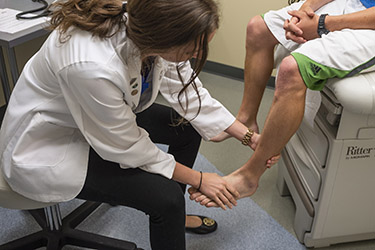Podiatry
On this page:
Professional Overview
 Podiatric medicine is a branch of the medical sciences devoted to studying human movement with the medical care of the foot, ankle, and related leg structures as its primary focus. A doctor of podiatric medicine (DPM) specialized in preventing, diagnosing, and treating foot disorders resulting from injury or disease. A DPM makes independent judgments, prescribes medications, and, when necessary, performs surgery.
Podiatric medicine is a branch of the medical sciences devoted to studying human movement with the medical care of the foot, ankle, and related leg structures as its primary focus. A doctor of podiatric medicine (DPM) specialized in preventing, diagnosing, and treating foot disorders resulting from injury or disease. A DPM makes independent judgments, prescribes medications, and, when necessary, performs surgery.
Podiatric medical schools are doctoral-level programs four years in length. Most states require podiatrists to complete a residency program after completing their four-year DPM program.
Podiatrists work in various settings, including private or group practices, hospitals, academics (research or education), outpatient care centers, government, or other healthcare settings.
General Pre-Podiatry Prerequisite Coursework; Wright State Specific Courses
Most podiatric medical schools require the following prerequisites:
- General Biology (with lab): 8 semester hours (BIO 1120, BIO 1150)
- General Chemistry (with lab): 8 semester hours (CHM 1210, CHM 1220)
- Organic Chemistry (with lab): 8 semester hours (CHM 2110, CHM 2120)
- Physics (with lab): 8 semester hours (PHY 1110, PHY 1120)
Some schools may require:
- Biochemistry and Molecular Biology: 3 semester hours (BMB 4210 or BMB 4001)*
*Suggested for MCAT preparation.
Note. Individual requirements vary by school. It is important to research individual health professions programs for specific requirements. Contact the Pre-Health Advisor for assistance.
Academic Major
Any major is acceptable if you complete the required prerequisite coursework, recommended extracurricular activities, and present a strong application to podiatric medical school. Podiatric medical schools seek students who have demonstrated they can do well, particularly in the prerequisite courses, and followed their academic interests.
Pre-medical students often major in one of the following since many of the prerequisite courses are part of the major’s academic requirements:
- Biological Science
- Biochemistry
- Chemistry
- Neuroscience
- Physics
- Psychology
- Public Health
Presenting a Competitive Application
Students should check directly with the schools they plan to apply to for application requirements, information, and timelines. Admissions to health professional schools tend to be very competitive. General admissions expectations include:
- Strong academic performance (3.4 or higher) in both your cumulative and prerequisite courses.
- Scoring highly (500 or higher) on the Medical College Admissions Test (MCAT).
- Podiatric medical schools require extensive familiarity with podiatric medicine to gain an appreciation for and understanding of the profession. Students should:
- Shadow several podiatrists to gain a realistic perspective of the profession.
- Gain direct patient and/or clinical exposure/experience in several unique and diverse settings and various types of patients.
- Get involved in community service, volunteer experiences, and co- and extracurricular activities on campus.
- Seek leadership responsibility, such as employment, church, community, and school organizations, including coaching, tutoring, and mentoring.
- Conduct research to help you understand scientific literature, how research is conducted, and distinguish credible research.
- Demonstrate the ability to balance school and responsibilities outside the classroom, demonstrating your ability to handle the difficult demands of podiatry school
- Exhibit strong interpersonal skills, the ability to work in teams and among a diverse group of people, and a desire to help others; communicate and listen effectively and possess skills to express your thoughts and ideas.
- While there is no minimum number of hours for each experience, most applicants demonstrate considerable experience.

